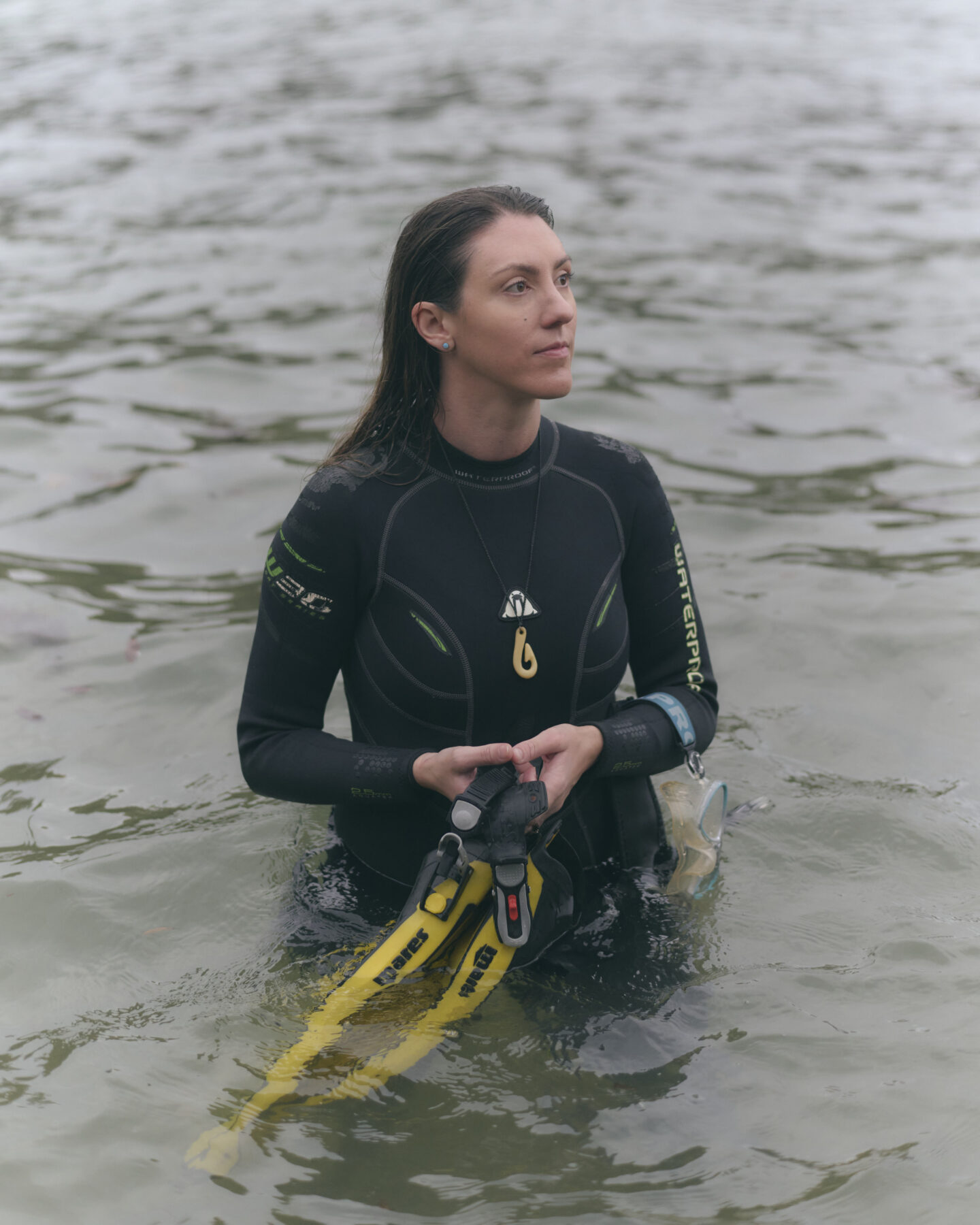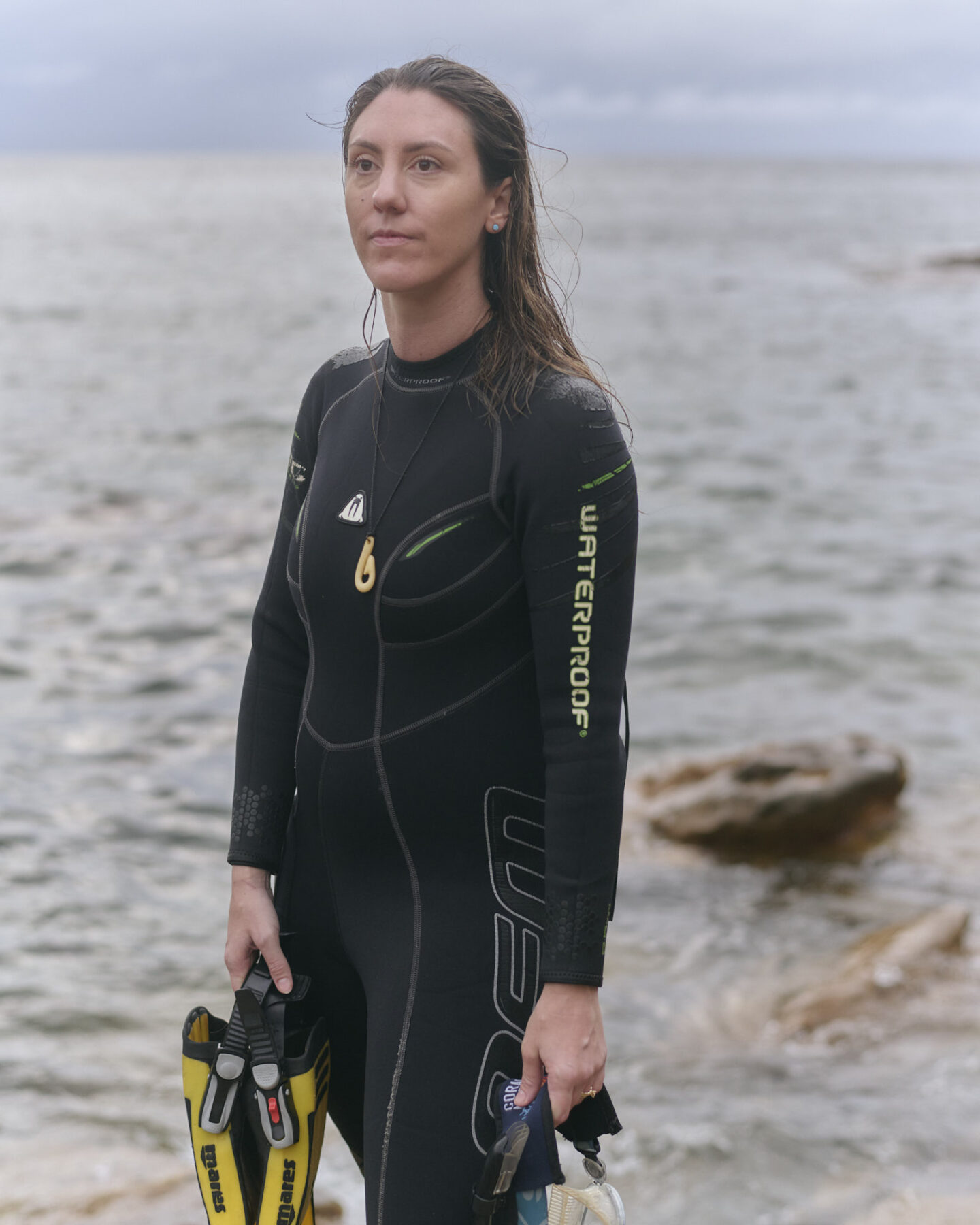Dr Emma Camp doesn’t remember exactly when her love of the ocean began, just that it’s always been part of her. She does, however, very clearly recall what sparked her passion for coral reefs.
She’d travelled, at the age of eight, with her parents from their home in Essex, England, to the Caribbean. “I saw a coral reef there for the first time and fell in love,” reflects Emma, now leader of the Future Reefs program at the University of Technology, Sydney (UTS). “I remember not being able to see the reef from above the water, putting on my mask, and then seeing this vibrant ‘city’ under there, with all these little yellow fish.” She couldn’t wait until she was old enough to learn to scuba dive.
But her career path to become a global leader in the fight to preserve and protect reefs has been rather convoluted. “Younger scientists ask me, on panel events for example, what [study] did I take and how did I get here,” Emma says. “I’ve had a very meandering path, but I’ve always worked hard to put myself out there and network. I don’t think things just happen; you lay the foundations for them to happen.”
When Emma was young, her mum, Frances, was always a guiding light. “She was a great inspiration – very resilient and a real fighter,” Emma recalls. “I definitely take that from her. I think as a scientist you need to be resilient, especially at the moment with all the challenges we face.”
Sadly, Frances succumbed to breast cancer when Emma was aged just 18 and her father, Peter, has since been her strongest support and influence. “Ever since I was little, he’s always told me to say, ‘I can and I will’ and that ‘can’t’ is not in our language,” she says.
An unconventional career path
So how did Emma build a career that took her from suburban Essex to Sydney, where she’s become a key protagonist in the fight not just for Australia’s own Great Barrier Reef (GBR), but the world’s coral reefs?
Unusually, it began with her aptitude as an elite athlete. Being a talented basketball player who’d represented Great Britain and England internationally, Emma was accepted after high school into a basketball scholarship in the US. There she pursued an undergraduate degree majoring in environmental science and chemistry at a small university college – Belmont Abbey College, in North Carolina. During her first semester, she visited a research station in the Turks and Caicos, a small tropical archipelago nation located south of the Bahamas, where she saw scientists working to preserve a reef.
“I learned through that study abroad program not only about the value of reefs, but also the threat they were under,” Emma recalls. “It was the first time I really understood there was a risk coral reefs could be lost within our lifetime due to human impacts and I realised I wanted to do something about that.”

She returned to England, landed another basketball scholarship and completed a master’s degree in environmental management and business at Sheffield Hallam University, her dissertation focussing on coral reefs. “I ended up going to Florida [in the US] where I worked with the diving industry to look at the impact scuba divers were having on coral reefs,” she says. “I was particularly interested in how conservation briefings telling divers about the importance of a reef affected their behaviour and interaction with it.”
In the late 2000s it was again back to England, where the worst recession since World War II was gripping the nation and it was hard to find work in environmental management. With the encouragement of her dad, Emma set up her own consultancy company performing environmental and energy audits for the housing industry, “just to do something in the environment space”, and to earn a living.
Then she heard from a colleague in Florida about a job opportunity at a research station in the Cayman Islands, in the Caribbean. “I applied, they offered me the position during the interview and said they wanted me there the following week,” Emma says. “I was torn because I felt I’d finally started to get some money and independence through the consultancy. But it wasn’t my passion.”
The answer came again from dad Peter. He pointed out she could always return to environmental consultancy. “But ‘this’, he said, ‘was a once in a lifetime opportunity’,” she recalls.
The three-month Cayman Islands contract developed into a 12-month commitment when the research station secured funding to investigate the impacts on coral reefs of changing ocean chemistry. She was invited to lead the project, which also provided an opportunity to pursue a PhD in coral reefs, but which required her to find university supervision.
Again, her dad was key. “He saw something in a newspaper about the University of Essex Coral Reef Research Unit,” Emma says. Securing PhD supervision there “meant that when I went back to England I could stay with my family and continue doing what I needed to do at university”.
It was the first time in her career she had a firm idea of the path she wanted to follow and, at its core, the intent was simple – help rescue the planet’s coral reefs before it’s too late.
Putting down roots in Australia
Emma arrived in Australia in 2016 to take up a fellowship under the Endeavour Leadership Program, a former federal government initiative that brought leading researchers to Australia for short-term study with the purpose of developing international ties between the nations involved.
She planned to stay for only six months but met her husband, Rawiri Heke, a New Zealander, here, became an Australian citizen and the pair had a son, Tāne, “a COVID baby” in mid-2020. Tāne has already been to Australia’s GBR several times and has seen bleached coral (a consequence of a warming planet) and knows what it means: “Nemo is losing his home because the anemones are turning white.” The couple are expecting a daughter in May.
In terms of professional inspiration, Emma’s biggest influence has been legendary US-based oceanographer and marine biologist Dr Sylvia Earle. Now aged in her 90s, Sylvia was, from 1990 to 1992, the first female chief scientist of the US National Oceanic and Atmospheric Administration (NOAA) and in 1998 was named Time Magazine’s first “Hero for the Planet”.
“Our paths have now crossed multiple times and I think she’s fantastic – not just because of what she’s achieved, but when she achieved it,” Emma says of Sylvia, who was kicking goals as a young scientist in a very male-dominated world. “To lead NOAA at a time when she would have been the only female scientist in the room every time is just inspiring to me.”
Emma has also been motivated by Sylvia’s achievements as a communicator of science. “Often, as individual scientists, we’re not always great at explaining the challenges we’re working on,” Emma says. “And yet, if we don’t do that, I think we’re failing as scientists, because the problems are too big for us to solve alone. We need society to understand what’s going on and Sylvia has done an amazing job of embracing that.”

Academically, Emma says, it’s been her PhD supervisors – Professors David Smith and David Suggett – and now her supervisor Professor Peter Ralph, who’ve played the most enduring role in her career and shaped her as a scientist. Notably, the two Daves, as she calls them, and Peter confirmed the value of communication in science and to always look for the practical application of her work. They have encouraged her, for example, to repeatedly ask how the science she is undertaking can be related back to communities or to the wider society in a valuable way. “That’s shaped the sort of scientist I’ve become and how I run my lab,” she says.
Emma has either received or been nominated for dozens of awards during the past decade, including being named, in 2018, as a Young Leader for the UN’s Sustainable Development Goals, in 2020, as a STEM Women’s Game Changer by the Australian Academy of Science and, in 2023, a winner of the prestigious WINGS WorldQuest Women of Discovery Award.
She says one of the proudest moments of her career was when she won Australia’s 2021 Eureka Prize for Outstanding Early Career Researcher. But, in terms of the broader opportunities it’s brought, she adds that acknowledgement from global watchmaker Rolex has been particularly significant. She won the 2019 Rolex Award for Enterprise and was named an Associate Laureate for the company, which has also provided her with ongoing support under its Rolex Awards for Enterprise initiative.
So, what’s next for this conservation Amazon? “To ensure there are reefs for future generations,” is the simple answer, Emma says. “There have been decades of research and researchers telling society and governments that reefs are under threat. This is not new information. There are leading Australian scientists who’ve been shouting this from the rooftops for a really long time, and yet there’s been no meaningful action, because the answer has got to be addressing climate change…ultimately, the biggest threat to reefs is the climate stress they are facing.”
And that’s why the message coming from her UTS lab is so important. “It’s my goal to continue in this role, to lead the next generation of scientists because ultimately, as an individual you can do very little,” Emma says. “But if we can share that knowledge with the next generation that’s how we amplify impacts.”



